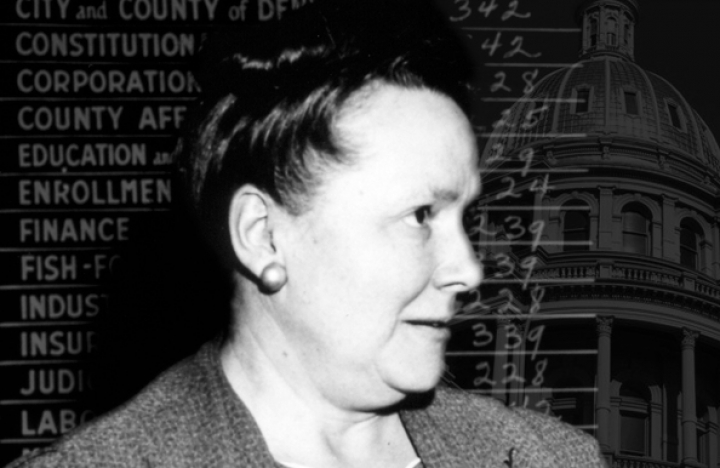Eudochia Bell Smith
Inductee Name
Eudochia Bell Smith
Place of Birth
Texas
Date of Birth
1887 – 1977
Year Inducted
1986
Category
Politics, Government & Military Service
Sponsor
The Denver Channel 7
Impact
Nationwide
Eudochia Bell Smith was successful in three careers in a lifetime that spanned ninety years. In each of these careers—as a newspaper editor, a Colorado legislator, and director of a federal agency—she was always involved in public affairs.
Eudochia Bell Smith started out as the society editor for the San Antonio Express. She soon developed into an ace reporter whose feature stories were syndicated. In 1910, she moved to the Houston Chronicle as associate editor. She had met Joseph Emerson Smith the year prior, who had started with the Denver Post. Joseph and Eudochia found they shared many common interests, including the writing of love stories. They married in February 1911.
Because of her husbands affection for Colorado, the couple moved to Denver in 1920. She concentrated on freelance writing until 1926, then she joined the Rocky Mountain News as women’s department editor. She also taught writing at the University of Denver and founded the Catholic Press Club of Colorado. After moving from Texas to Colorado, she became women’s page editor for the Rocky Mountain News. After hearing stories of deplorable conditions for boys in the State Industrial School in Golden, Eudochia became interested in politics. She announced her candidacy for the Colorado House of Representatives on the Democratic ticket. Eudochia plunged in the political world of eight or ten campaign meetings a night. Often, she waited through hours of speeches to give her own ten-minute talk.
In 1936, Eudochia was elected to the House by a wide majority and the next January she climbed the steps of the state capital under a new name “Smith of Denver.
She began inviting Father Edward Flanagan of Boys Town, Nebraska, to investigate the school. Using his findings, she wrote a bill offering a three-point remedy: improve the parole system, institute cottages with a homier atmosphere, and have service clubs appoint a Big Brother for each of the boys. Here new law took a significant first step in dealing with juvenile delinquency. She came to believe that “laws affecting the welfare of women and children need the feel of a women’s hand-clasp, her guidance and protection.”
She also became involved with food service regulations. There were few regulations on lunch counters, wayside hamburger joints and boarding houses. Her proposed legislation would require costly changes in office buildings and other places that served food, especially in regard to sanitary requirements for washing dishes.
Smith recognized her opposition. She was a woman in a man’s realm. She was the well-paid lobbyists seated at the back and male legislators reading material other than the restaurant bill. Then she remembered how she handled her husband, not by trying to force him but by using straight talk. After speaking up, much debate ensued and her bill was hotly opposed, but passed and set much-needed sanitary standards.
Her co-sponsored Colorado ground-breaking Old Age Pension Bill, which paid $45 a month to eligible, elderly Coloradan passed.
Smith earned such a strong reputation in the House that she was elected to the state Senate in 1941, becoming the third woman to serve there and the only woman in the Senate for twenty-five years. As a freshman senator in 1941, she introduced one of the hardest-fought bills ever passed in the Colorado Senate: the one to allow women to sit on juries. Thousands of Colorado women centered their energy upon this one issue. Women marched to the Capitol to fill all seats. Male responses were furious, which stunned her. “Women are too emotional to sit on a jury!” “It must be defeated!” “You and your kind are responsible for juvenile delinquency!” “A housewife should be in the home all the time!” She continued reading, and reminded the male senators that when they asked women’s clubs to endorse their candidacy, it resulted in many of them pledging to support their bill for women on juries. The Colorado Assembly passed the bill by a narrow margin, but the next general election passed it by a landslide.
In February 1946, President Harry Truman appointed her as registrar of the U.S. District Land Office at Denver.
Eudochia died in Denver at the age of ninety, and was buried at Mt. Olivet Cemetery.


